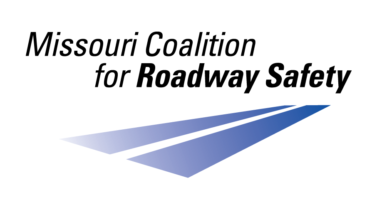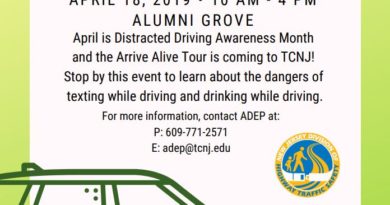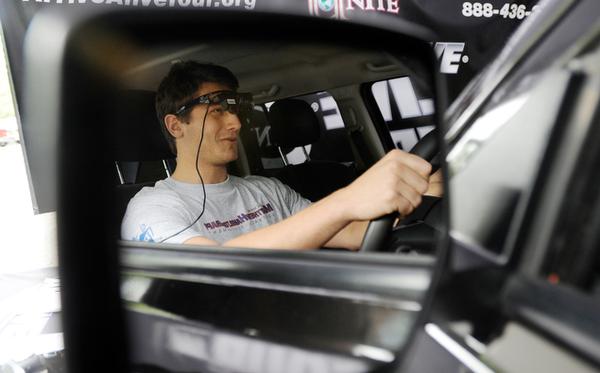‘Crash’ course for teen drivers
 |
| Foxborough Regional Charter School After School Coordinator Josette Perkins participates in one of two driving simulations provided by Teen DRIVE. The program travels to high schools throughout Massachusetts and is free of charge thanks to a generous grant from Allstate. (Photo by Christine Igo Freeman) |
By Christine Igo Freeman
“The students participating were very excited to try out the program, and many thought it to be like a video game at first,” said FRCS Student Life Advisor Jamie Droste. “I tried to touch base with each student as they exited the program and many were shaking their heads saying they had crashed during the simulation, or even suffered multiple crashes! They told me that they crashed trying to text, or while they were virtually impaired. Just the look on their faces told me they understood the lesson very well.”
The program travels to high schools and other venues around the state of Massachusetts. Droste first heard about Teen DRIVE from school nurse Cathy Alix last October after Alix attended a Norfolk County School Partnership meeting.
DRIVE stands for Distracted Reality an Interactive Virtual Education, and more than 500 teens, including juniors and seniors at FRCS, have participated in the program that has been in existence for almost five years.
This program is sponsored by the UMass Memorial Medical Center in Worcester and is totally free of charge because it is funded by a grant from Allstate.
“We’re not teaching teens to drive. We are teaching them the consequences of distracted or impaired driving,” says Coordinator Esther Borer, CPST of the Injury Prevention Center at UMass Memorial.
Borer spent three days this week at the FRCS, where she worked with more than 70 students, faculty members and parents. She explained that Teen DRIVE began the day texting became illegal in Massachusetts at the end of September 2010.
The program is housed in a 44-foot truck containing two driving simulators that mimic the interior of a car. Each simulator is equipped with a car seat complete with seat belt, steering wheel, gas pedal, brake pedal and a computer screen. Each session lasts for a half hour during which time the “driver” will experience two driving simulations.
One of the simulations challenges the participant with cell phone related distractions, such as talking and texting while driving. Borer points out that cell phone use (hand held and hands free) for drivers in Massachusetts under the age of 18 years old is illegal. She also explained that there is a ban on texting for all drivers, but that drivers over 18 are still allowed to talk on the phone.
During Borer’s visit, she observed that some students were able to text and drive; however, many more students suffered the consequences of distracted driving. She also noted that it is not unusual for adults to feel nauseous and dizzy during the simulation.
Every participant starts with a “Free Drive” experience. During this practice session the person is free to drive anywhere, but must obey all traffic laws. Other scenarios include peer distractions inside the car when driving with friends and diversions outside the vehicle, such as deer running in front of the car.
The second simulation provides the driver with an impaired driving experience such as being under the influence of drugs and/or alcohol. This simulation also includes the possibility of the driver sustaining injuries in a car accident and being transported to a trauma bay at a hospital.
Another scenario is the participant is driving at night in rainy conditions and is arrested for driving under the influence (DUI). This scenario includes the participant having to appear in court in front of a judge for sentencing.
“We have had a lot of parent communication, with parents wanting their juniors and seniors to do the program,” Droste explained. “We also have had a lot of interest from parents of younger children wanting us to bring the program back next year.”
She added that students had to have their driving license or driving permits in order to participate in the program.
“There is a lot of talk in the hallways in between classes, kids comparing their experience behind the wheel of the virtual program,” Droste said. “That’s why the program is so powerful; it promotes discussion about the consequences of distracted teen driving.”
For more info on Teen DRIVE, please contact Injury Prevention Coordinator Esther Borer at 774-443-8627 or ester.borer@umassmemorial.org. Borer encourages interested schools to call soon because the schedule for 2014 is filling up fast.




You must log in to post a comment.